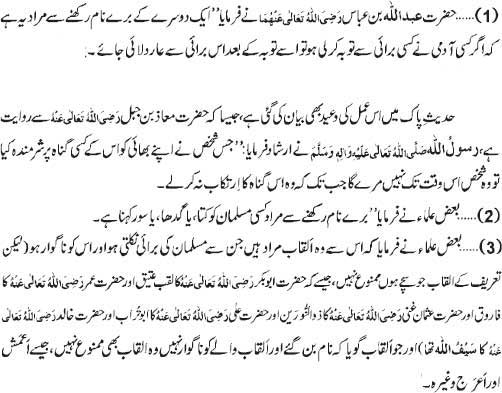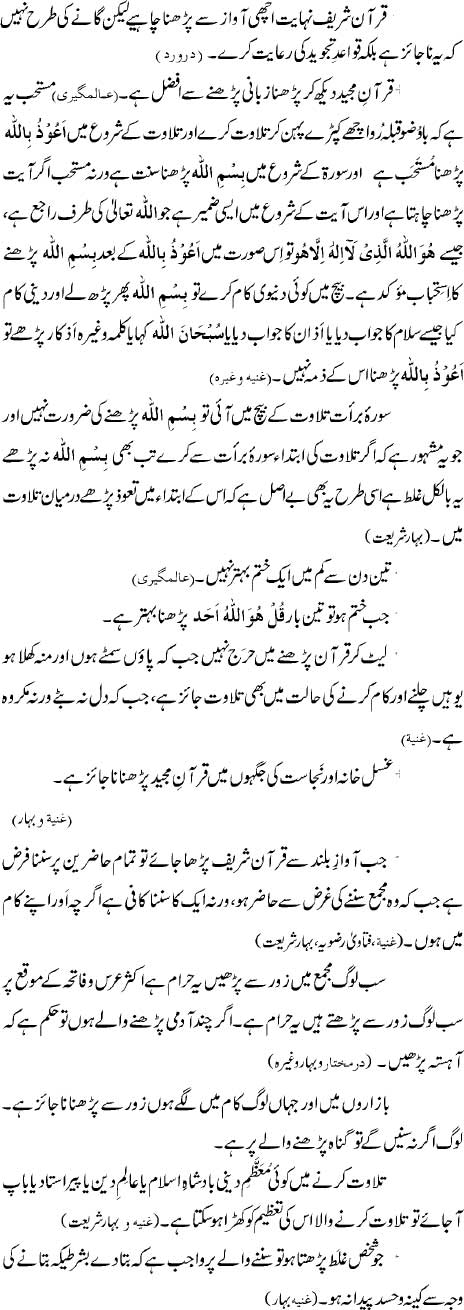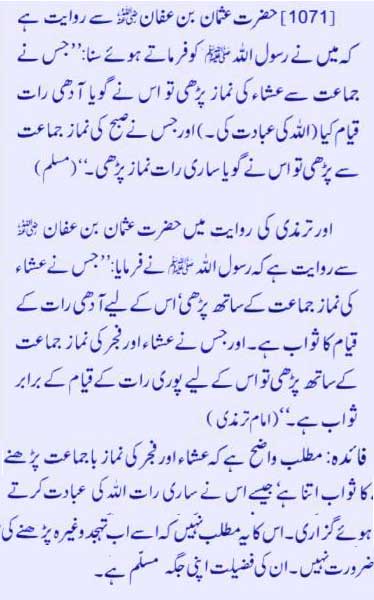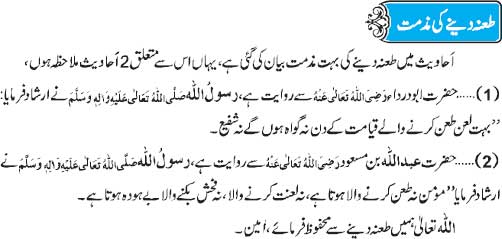
Learn, And Teach Allah’s Quran To Mankind
Allah’s command to believers: Learn, understand, embrace, practice, and teach Allah’s Quran to mankind.
[Quran – 9:122] “It was not necessary for the believers to go forth all together (to receive religious instruction), but why did not a party of them go forth that they may grow in religious understanding, and that they may warn their people when they return to them, so that they may avoid (erroneous attitudes)?”
The Prophet (peace be upon him) has said: [Bukhari, Book #61, Hadith #545] “Narrated ‘Uthman: The Prophet said, “The best among you (Muslims) are those who learn the Qur’an and teach it.”
Tilawat-e-Quran Kay Ahkam

What The Qur’an Says: Allah’s Unfailing Support
In the name of Allah, the Lord of Grace, the Ever Merciful We shall indeed support Our messengers and the believers both in this world’s life and on the Day when all the witnesses shall stand up. On that Day their excuses will be of no avail to the wrongdoers: their fate will be rejection, and they will have the worst of homes.
And indeed, We bestowed Our guidance on Moses and passed down the Book to the children of Israel as a guide and a reminder to people of understanding. Therefore, remain patient in adversity, for Allah’s promise always comes true. Ask forgiveness for your sins and extol your Lord’s glory and praise evening and morning. (The Forgiving; Ghafir: 40: 51-55)
This passage is given as a comment on the whole episode detailed in a long discourse about Moses and the reaction of Pharaoh to his call on him to abandon his false claim to Allahhead and to believe in Allah’s oneness. It comments on what preceded this long passage of reference to the different communities which suffered Allah’s punishment after taking a negative attitude toward His message. Furthermore, it states Allah’s attitude to the unbelievers as they stubbornly reject the calls of His messengers. Allah’s support is certain to come, not only to Allah’s messengers but to the advocates of the true faith when they follow in the prophets’ footsteps, as indeed happened to the believer in Pharaoh’s household.
This definitive comment suits the decisive situation. We have been given an example of the end of truth and falsehood, both in this world and in the life to come. We have seen what fate befell Pharaoh and his noblemen in this life, and we have seen them disputing in hell, utterly humiliated. Such is the end of these communities, as stated in the Qur’an: “We shall indeed support Our messengers and the believers both in this world’s life and on the Day when all the witnesses shall stand up. On that Day their excuses will be of no avail to the wrongdoers: their fate will be rejection, and they will have the worst of homes.”
As for the life to come, perhaps no believer in life after death will argue about this. They do not find any reason to argue. As for victory in this present world, this may need some explanation.
Allah’s promise is clear and definitive: “We shall indeed support Our messengers and the believers both in this world’s life and…” Yet we see that some messengers were killed, and some had to abandon their homes after being rejected and driven out. Some believers have also been exposed to grievous suffering; some were thrown into the fire pit; some fell martyrs; some live in exceedingly difficult circumstances. What happens, then, to Allah’s promise of support being given to them in this present life? Satan tries hard to exploit this situation, working hard to shake people’s faith.
People, however, use superficial measures when evaluating things, and they overlook many values and facts. They look at a brief period of time and a small area or space. These are limited human measures. A comprehensive look shows the situation to occur in a broad span of time and place. It does not erect limits between one era or place and another. If we look at the question of faith from such a broad perspective, we will see it triumphant, no doubt. Its triumph is the victory of its upholders. They have no existence separate from their existence. The first thing faith requires of them is to dedicate themselves to it completely, so that it is almost as if they disappear while it stays in full vision.
Moreover, people often limit the meaning of victory to a specific outcome they know and can easily recognize. But victory can take different forms, some of which might superficially at least appear akin to defeat.
When Prophet Abraham (peace be upon him) was thrown into the fire and remained resolute in his determination to stick to his faith and advocate it, was he in a position of victory or defeat? From a faith perspective, he was undoubtedly at the highest point of victory as he was being cast into the fire. He again triumphed when he was saved from the fire. These are two different images that appear to be poles apart, but they are in fact very close to each other. Al-Husayn, the Prophet’s grandson, met his martyrdom in a way that is tragic from one angle and splendid from another: so was he victorious or vanquished? On the surface, and judging by immediate considerations, it was a defeat. In reality and from a wider perspective, though, it was a true victory. No other martyr excites sympathy and feelings of support, among both Sunnis and Shiites, like Al-Husayn. Indeed, such feelings also apply to many non-Muslims.
Many are the martyrs who achieved their faith through martyrdom which they could never have achieved in life had they lived a thousand years. They could not impress great meanings on people’s minds or motivate them to act like they did with their final sermon, written with their own blood. Their martyrdom provided motivation for their children and grandchildren, and at times they provided the motivation to change history over several generations.
– By Romulo Tangbawan
Fareeb Nafs

by Mufti Muneeb Ur Rehman
Allah (Almighty!) Has Angels Who Seek The People Of “Dhikr”
The Prophet(Sall Allahu Alayhi Wa Sallam ) said that: Allah has angels roaming the roads to find the people of dhikr, i.e. those who say La Ilaha Illallah and similar expressions, and when they find a group of people (qawm) reciting dhikr, they call each other and encompass them in layers until the first heaven — the location of which is in Allah’s knowledge. (This is to say, an unlimited number of angels are going to be over that group.
Allah asks His angels, and He knows already (but he asks in order to assure it and make it understandable for us)
“What are my servants saying?” (He did not say “servant,” but `Ibadi, “servants” in the plural.)
The angels say: “They are praising You (tasbih) and magnifying Your Name (takbir) and glorifying You (tahmid), and giving You the best Attributes (tamjid).”
Allah says: “Have they seen Me?” The angels answer: “O our Lord! They did not see You.” He says: “(They are praising Me without seeing Me,) what if they see Me!?”
The angels answer: “O our Lord if they saw You, they are going to do more and more worship, more and more tasbih, more and more takbir, more and more tamjid!”
He says: “What are they asking?” Angels say: “They are asking Your Paradise!” He says: “Did they see Paradise?” They say: “O our Lord, no, they have not seen it.” He says: “And how will they be if they see it?” They say: “If they see Paradise, they are going to be more attached and attracted to it!”
He says: “What are they fearing and running away from?” (When we are saying, “Ya Ghaffar (O Forgiver), Ya Sattar (O Concealer),” it means that we are fearing Him because of our sins. We are asking Him to hide our sins and forgive us.) They say: “They are fearing and running away from hellfire.”
Allah (Almighty) says: “And have they seen hellfire?” They say: “O our Lord, no, they did not see hellfire.” He says: “And how will they be if they see fire and hell?” They say: “If they see your fire, they are going to be running from it more and more, and be even more afraid of it.”
(Now listen to this carefully:) And Allah says: “I am making you witness (and does Allah need witnesses? He needs no witness since He said: “Allah is sufficient as a witness.” Why make the angels witnesses? Does Allah change His word? “Making you witness” here means, “Assuring you”) that I have forgiven them.” (Why has Allah forgiven them? Because, as the beginning of the hadith states, they are a group of people reciting the Names of Allah and remembering Him with His dhikr.)
One of the angels says: “O my Lord, someone was there who did not belong to that group, but came for some other need.” (That person came for some other purpose than dhikr, to ask someone for something.)
Allah says: “Those are such a group that anyone who sits with them — no matter for what reason — that person will also have his sins forgiven.”
Sari Raat Ibadat ka Sawab

Who So Ever Does An Atom’s Worth of Good Will See It
[ALLAH’S Quran – 99:7-8] “Then, whoever did (even) an atom’s worth of good, shall see it, And whoever commits an atom’s worth of evil, shall see it.”
The Prophet (peace be upon him) has said:
[Hadith – Bukhari, Book #56, Hadith #839] “Narrated Abu Huraira: The Prophet said, “A horse may be kept for one of three purposes: for a man, it may be a source of reward; for another, it may be a means of living; and for a third, it may be a burden (a source of committing sins). As for the one for whom it is a source of reward, he is the one who keeps his horse for the sake of Jihad in Allah’s Cause; he ties it with a long rope on a pasture or in a garden. So whatever its rope allows it to eat, will be regarded as good rewardable deeds (for its owner). And if it breaks off its rope and jumps over one or two hillocks, even its dung will be considered amongst his good deeds. And if it passes by a river and drinks water from it, that will be considered as good deeds for his benefit) even if he has had no intention of watering it. A horse is a shelter for the one who keeps it so that he may earn his living honestly and takes it as a refuge to keep him from following illegal ways (of gaining money) and does not forget the rights of Allah (i.e. paying the Zakat and allowing others to use it for Allah’s Sake). But a horse is a burden (and a source of committing sins for him who keeps it out of pride and pretense and with the intention of harming the Muslims.” The Prophet was asked about donkeys. He replied, “Nothing has been revealed to be concerning them except this comprehensive Verse (which covers everything):–‘ Then whosoever has done good equal to the weight of an atom (or a small ant), Shall see it (its reward) And whosoever has done evil equal to the weight of an atom (or a small ant), Shall see it (Its punishment).”
[Hadith, Muslim, Book #005, Hadith #2163] “Abu Huraira reported Allah’s Messenger (may peace be upon him) as saying:……………………. The horses are of three kinds. They are a source of reward to a person, they are a covering to a person, and they are a burden to a person. As for those who bring reward is that a person would get reward who rears them for the sake of Allah and trains them for Him, and nothing disappears in their stomachs but Allah would record for him a good deed. And if they were to graze in the meadow, they would eat nothing but Allah would record for him a reward. And if they were to drink water from the canal, with every drop that, would disappear in their stomachs there would be a reward (for the owner). He went on describing till a reward was mentioned for their urine and dung. And if they pranced a course or two, there would be recorded a reward for every pace that they covered. As for one for whom they are a covering, he is the man who rears them for honor and dignity but does not forget the right of their backs and their stomachs, in plenty and adversity, As regards one for whom they are a burden, he is that who rears them for vainglory and showing off to the people; for him they are, the burden. They said: Messenger of Allah, what about asses? He said: Allah has not revealed to me anything in regards to it except this one comprehensive verse:” He who does an atom’s weight of good will see it, and he who does an atom’s weight of evil will see it”
[Hadith – Malik’s Muwatta, Book #21, Hadith #21.1.3] “Yahya related to me from Malik from Zayd ibn Aslam from Abu Salih as-Samman from Abu Hurayra that the Messenger of Allah, may Allah bless him and grant him peace, said, “Horses are a reward for one man, protection for another, a burden for another. The one who has them as a reward is the one who dedicates them for use in the way of Allah and tethers them in a meadow or grassland. Whatever the horse enjoys of the grassland or meadow in the length of its tether are good deeds for him. If it breaks its tether and goes over a hillock or two, its tracks and droppings are good deeds for him. If it crosses a river and drinks from it while he did not mean to allow it to drink it, that counts as a good deed for him, and the horse is a reward for him. Another man uses his horse to gain self-reliance and up-standingness and does not forget Allah’s right on their necks and backs (i.e. he does not ill-treat or overwork them). Horses are a protection for him. Another man uses them out of pride to show them off and in hostility to the people of Islam. They are a burden on that man.” The Messenger of Allah, may Allah bless him and grant him peace, was asked about donkeys, and he said, “Nothing has been revealed to me about them except this single all-inclusive ayat, ‘Whoever does an atom of good will see it, and whoever does an atom of evil, will see it.”
Tana Denay Ki Muzammat

Call People To The Way Of Your Lord With Wisdom
[ALLAH’S Quran- 16:125] “Call people to the Way of your Lord with wisdom and best advice, and reason with them, if you have to, in the most courteous manner: for your Lord knows best who strays from His Way and He knows best who is rightly guided.”
The Prophet (peace be upon him) has said: [Muslim, Book #034, Hadith #6470] “Abu Huraira reported Allah’s Messenger (may peace be upon him) as saying: He who called (people) to righteousness, there would be reward (assured) for him like the rewards of those who adhered to it, without their rewards being diminished in any respect. And he who called (people) to error, he shall have to carry (the burden) of its sin, like those who committed it, without their sins being diminished in any respect.”
[Malik’s Muwatta, Book #15, Hadith #15.9.41] “Yahya related to me from Malik that he had heard that the Messenger of Allah, may Allah bless him and grant him peace, said, “No one calls to guidance without having the same reward as those who follow him without diminishing their rewards at all. And no one calls to error without having the same burdens as they do without diminishing their burdens.”

